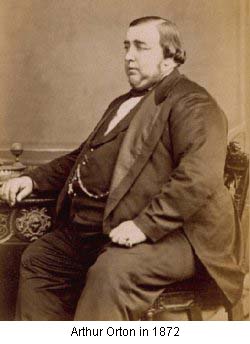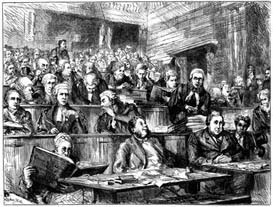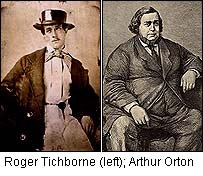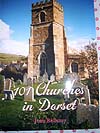Upton House and Its Famous Trial
by Jean Bellamy
 On
11th May 1871 there started one of the most renowned legal
battles ever to have taken place. The famous Tichborne Trial
went down in the Guinness Book of Records as the longest in
history. On
11th May 1871 there started one of the most renowned legal
battles ever to have taken place. The famous Tichborne Trial
went down in the Guinness Book of Records as the longest in
history.
The defendant was Arthur Orton, alias Thomas Castro (1834-1898)
from Wapping, Australia, the son of a butcher. He claimed to be
Sir Roger Tichborne, heir to estates at Tichborne near Alresford,
Hampshire, and Upton House, Poole, Dorset. The Upton estate had
been in the ownership of the family from around 1828 when it was
acquired by Edward Tichborne Doughty. The latter having no sons,
his nephew, Sir Roger Tichborne, became heir to the family
fortunes.
Sir Roger had fallen in love with his cousin, Katherine, but was
forbidden to marry her, and after a number of quarrels was banned
from Upton House. He left this country intending to return and
marry her at a later date, but it was while sailing to America on
the Bella that he disappeared and was presumed dead. The
ship was believed to have been lost with all passengers, one of
those named being a Sir Roger Tichborne.
Everyone believed Sir Roger to be dead except his mother, Lady
Tichborne, who never gave up hope that he would return. She
advertised regularly in newspapers for information as to his
whereabouts, and even kept a candle burning in his room at Upton
House. After a number of years, the advertisement was seen by an
enquiry agent who persuaded Orton to write to Lady Tichborne
claiming to be her son. Orton did so, stating that there had
been legal reasons for his prolonged absence, including
difficulties with Australian law.
On seeing Orton's photograph, Lady Tichborne was convinced he was
her long lost son, though others were more sceptical. By chance,
Orton met a family servant of the name of Andrew Boyle who was
sure he was Lord Tichborne. With Boyle's help, Orton was able
to familiarise himself with the habits, mannerisms and life
history of Sir. Roger. Funds were sent out to him so that he
could return to England, though he had already borrowed enough
for his family and himself.
Orton arrived in December 1866 and went immediately to the
Alresford estate and Upton House. Amazing as it may seem, and in
spite of the fact that he appeared to have changed from a slim
young man to a heavy stocky one of almost 28 stone, his mother
accepted him as her own long-lost son. Members of staff and
friends accepted him too, though the remainder of the family were
not convinced. In no time, the story of Orton's claim spread far
and wide, and the national newspapers carried huge headlines. In
1868, however, Lady Tichborne passed away, as did the family
solicitor who had also believed in him. By this time, Orton was
almost bankrupt, so Tichborne bonds were issued to provide funds.
 In
1871, five years after the claimant had landed in England, the
trial commenced. It covered a period of 1,025 days (a total of
three years less seven weeks), cost £90,000, and resulted
in a sentence of perjury. The Civil trial began on 11th May
1871 and collapsed on 6th March 1872; the Criminal trial which
followed ended on 28th February 1874. Both proved of tremendous
interest to the public, large groups of people congregating in
the streets of London. Even the Prince of Wales and the
princesses attended the Court, and over one hundred witnesses
swore that Orton was Sir Roger Tichborne. Handwriting specimens
were produced and compared, but it is said that the verdict was
somewhat influenced by the fact that Sir Roger had a tattoo mark
on his arm and Orton did not. In
1871, five years after the claimant had landed in England, the
trial commenced. It covered a period of 1,025 days (a total of
three years less seven weeks), cost £90,000, and resulted
in a sentence of perjury. The Civil trial began on 11th May
1871 and collapsed on 6th March 1872; the Criminal trial which
followed ended on 28th February 1874. Both proved of tremendous
interest to the public, large groups of people congregating in
the streets of London. Even the Prince of Wales and the
princesses attended the Court, and over one hundred witnesses
swore that Orton was Sir Roger Tichborne. Handwriting specimens
were produced and compared, but it is said that the verdict was
somewhat influenced by the fact that Sir Roger had a tattoo mark
on his arm and Orton did not.
The prosecution's closing address lasted a fortnight and the
speech for the defence one-and-a-half months. The Lord Chief
Justice's summing up occupied one month, though the Jury were out
for only half-an-hour. The defendant was deemed an imposter and
sentenced to two seven-year consecutive terms of imprisonment and
hard labour. Following this, protest meetings were held in Hyde
Park, and when Orton died in 1898, over five thousand people
attended his funeral. Even to the present time there are said to
remain doubts about the case and mysteries which have never been
fully cleared up.
Following the departure of the Tichborne family from the Upton
estate, the house appears to have been dogged by misfortune, even
to being haunted by the ghost of Sir Roger. As it proved
impossible to sell the house for some time, it was rented out to
various families, of whom two suffered from consumption. In
1901 it was bought by William Llewellyn. Sadly, his wife was
killed in a car crash near Poole. He later became High Sheriff of
Dorset, and one of his two sons, John Jestyn, was created Baron
Llewellyn of Upton, later becoming the first Governor-General of
the Federation of Rhodesia and Nyasaland. William Llewellyn's
daughter, Mary, held the distinction of being the first female
Mayor of Poole.
 In 1957, Upton House and grounds were sold to Poole
Council and were subsequently leased to Prince Carol of Romania
who occupied the property for nine years. During his tenancy,
lavish receptions were held, the guests being well wined and
dined, though the house was allowed to fall into disrepair and
the grounds became completely overgrown. On the departure of
this family, however, they were cleared and reclaimed by the
Council, and today Upton Country Park, as it is known, is open to
the public at all times of the year. With its nature trails,
wildlife, fresh water lake, peacocks, and a cafeteria and
heritage centre, it is a very pleasant place in which to spend a
few hours on a fine day. In 1957, Upton House and grounds were sold to Poole
Council and were subsequently leased to Prince Carol of Romania
who occupied the property for nine years. During his tenancy,
lavish receptions were held, the guests being well wined and
dined, though the house was allowed to fall into disrepair and
the grounds became completely overgrown. On the departure of
this family, however, they were cleared and reclaimed by the
Council, and today Upton Country Park, as it is known, is open to
the public at all times of the year. With its nature trails,
wildlife, fresh water lake, peacocks, and a cafeteria and
heritage centre, it is a very pleasant place in which to spend a
few hours on a fine day.
Upton house, which stands on the northern shores of Poole
Harbour, has been described as one of the most interesting in
Dorset. The estate's history dates back to Roman times and was
said to have been sold to a 'person unknown' in the late 16th
century by James, Lord Mountjoy, Lord of the Manor of nearby
Canford Magna. Since then, owners have included two generations
of the Spurrier family who gained and lost their fortune in the
trade carried out between the town of Poole and Newfoundland at
the end of the eighteenth and beginning of the nineteenth
centuries.
On a personal note, my great-grandfather, John Benjamin Franklin,
served on the jury of the Tichborne Trial for a whole year, as a
consequence of which he was exempt from jury service for life.
More Information:
We regret that we no longer have the resources to maintain up-to-date links and/or hours and pricing details for the various sites and attractions listed on this website. For more information about the location(s) listed above, please use your favorite search engine or visit Wikipedia.
 |
Jean Bellamy has been writing since 1970, and is the author of over 300 published articles and short stories. She has written three children's novels (all with a "West Country flavour"). A resident of Dorset, she is the author of several local history books, including Treasures of Dorset, A Dorset Quiz Book, Second Dorset Quiz Book, Dorset Tea Trail, Dorset as she was spoke, Little Book of Dorset, 101 Churches in Dorset, and Cornwall: A Look Back. Jean loves to explore and write on all things British.
|
Article © 2008 Jean Bellamy
Photos courtesy of Wikipedia.org
|
